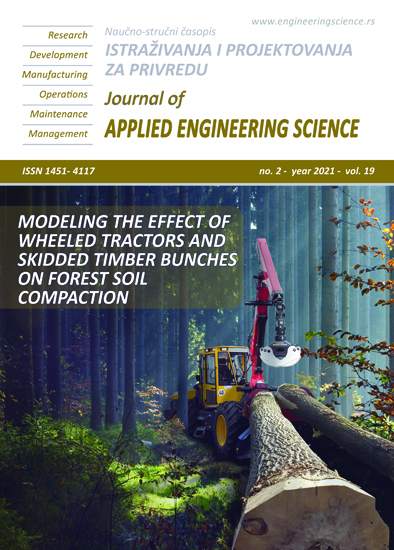SUSTAINABILITY AND ENVIRONMENTAL CHALLENGES OF MODERN SHIPPING INDUSTRY
Abstract
Nowadays, maritime transport faces more challenges than at its beginning. Like any other industry, the maritime sector must adapt to the needs of the modern world and carry out its activities with respect for the environment. Continuous technological development and increased environmental awareness are the determining factors of changes in modern shipping. Therefore, one of the main challenges of maritime transport is to implement innovative solutions to protect the marine environment. However, it is quite challenging to achieve both ecological and economic benefits at the same time. That is why it is very important to apply the win-win principle, which refers to the sustainable development of maritime transport. The paper provides an overview of applicable and promising technological solutions, logistical activities, and regulatory provisions applied in reduction of shipping gas emissions, as well as importance of points to be considered in development of sustainable shipping. Innovative methods of adapting to the increasingly restrictive environmental regulations are presented as well.
References
Walker, T. R. et al. (2019). Environmental Effects of Marine Transportation. In Shepard, C. (Eds.) World Seas: An Environmental Evaluation, Volume III: Eco¬logical Issues and Environmental Impacts pp. 505- 530.
Royal Academy of Engineering (2013). Future Ships Powering Options, Exploring alternative methodes of ship propulsion, from: https://www.raeng.org.uk/ publications/reports/future-ship-powering-options, accessed on 2020-07-06.
Marine-Electronics.eu (2020). New sulfur regula¬tions from 2020, from: https://marine-electronics.eu/ sulfur-regulations-in-shipping-industry-from-2020, accessed on 2020-05-05.
Badurina, P., Cukrov, M., Dundovic, C. (2017). Contribution to the implementation of “Green Port” concept in Croatian seaports. Scientific Journal of Maritime Research, vol. 31, pp. 10-17. DOI: 10.31217/p.31.1.3
Nikitakos, N. (2012). Green Logistics – The concept of Zero Emissions Port. FME Transactions, vol. 40, pp. 201-206.
International Maritime Organization (IMO) (2014). Third IMO Greenhouse Gas Study 2014. Executive Summary and Final Report, Suffolk, UK.
Lee, P. T.-W., Kwon, O. K., Ruan, X. (2019). Sustain¬ability Challenges in Maritime Transport and Logis¬tics Industry and Its Way Ahead. Sustainability, vol. 11 (1331) DOI: 10.3390/su11051331
Frajman Ivkovic, A., Ham, M., Mijoc, J. (2014). Mea¬suring Objective Well-Being and Sustainable Devel¬opment Management. Journal of Knowledge Man¬agement, Economics and Information Technology, vol. 4 (2), pp. 1-8.
Aulinger, A. et al. (2016). The impact of shipping emissions on air pollution in the greater North Sea region – Part 1: Current emissions and concentra¬tions. Atmospheric Chemistry and Physics, vol. 16, pp. 739-758. DOI: 10.5194/acpd-15-11277-2015
Blasco, J. et al. (2014). Towards an integrated envi¬ronmental risk assessment of emissions from ships’ propulsion systems. Environment International, vol. 66, pp. 44-47. DOI: 10.1016/j.emvint.2014.01.014
Corbett, J. J. et al. (2007). Mortality from Ship Emis¬sions: A Global Assessment. Environmental Science & Technology, vol. 41 (24), pp. 8512-8518. DOI: 10.1021/es071686z
Shin, S.-H., et al. (2018). Analyzing Sustainability Literature in Maritime Studies with Text Mining. Sus¬tainability, vol.10 (3522). DOI: 10.3390/su10103522
Bergqvist, R., Turesson, M., Weddmark, A. (2015). Sulphur emission control areas and transport strat¬egies – the case of Sweden and the forest industry. European Transport Research Review, vol. 7 (10). DOI: 10.1007/s12544-015-0161-9
Campara, L., Hasanspahic, N., Vujicic, S. (2018). Overview of MARPOL ANNEX VI regulations for pre¬vention of air pollution from marine diesel engines. SHS Web of Conferences 58, 01004, GLOBMAR 2018.
DNV-GL (2019). EU MRV and IMO DCS, from: https://www.dnvgl.com/maritime/insights/topics/EU-MRV-and-IMO-DCS/index.html, accessed on 2020- 05-08.
Psaraftis, H. N. (2016) ‘Green maritime logistics: the quest for win-win solutions’, Transportation Re¬search Procedia, vol. 14, pp. 133-142.
Bouman, E. A. et al. (2017). State-of-the-art tech¬nologies, measures, and potential for reducing GHG emissions from shipping – A review. Transporta¬tion Research Part D, vol. 52, pp. 408-421. DOI: 10.1016/J.TRD.2017.03.022
Rehmatulla, N., Calleya, J., Smith, T. (2017). The im¬plementation of technical energy efficiency and CO2 emission reduction measures in shipping. Ocean Engineering, vol. 139, pp. 184-197. DOI: 10.1016/J. OCEANENG.2017.04.029
Den Boer, E., Hoen, M. (2015). Scrubbers – An eco¬nomic and ecological assessment. NABU, Delft.
Yin, J. et al. (2014). Slow steaming of liner trade: its economic and environmental impacts. Maritime Policy & Management, vol 41 (2), pp. 149–158. DOI: 10.1080/03088839.2013.821210
Fagerholt, K. (2004). A computer-based decision support system for vessel fleet scheduling—ex¬perience and future research. Decision Support Systems, vol. 37, pp. 35-47. DOI: 10.1016/S0167- 9236(02)00193-8
Wang, K., Fu, X., Luo, M. (2015). Modeling the im¬pacts of alternative emission trading schemes on international shipping. Transportation Research Part A, vol. 77, pp. 35-49. DOI: 10.1016/j.tra.2015.04.006
Eide, M. S. et al. (2011). Future cost scenarios for reduction of ship CO2 emissions. Maritime Pol¬icy & Management, vol. 38 (1), pp. 11-37. DOI: 10.1080/03088839.2010.533711
Rakhmangulov, A. et al. (2017). Green Logistics: Element of the Sustainable Development Concept. Part 1. Nase More, vol. 64 (3), pp. 120-126. DOI 10.17818/NM/2017/3.7
Port of Gdyna Authority (2018). yetiSense Monitors Air Quality at the Port of Gdynia, from: https://www. port.gdynia.pl/en/events/news/1221-yetisense-mon¬itors-air-quality-at-the-port-of-gdynia, accessed on 2020-06-07.

